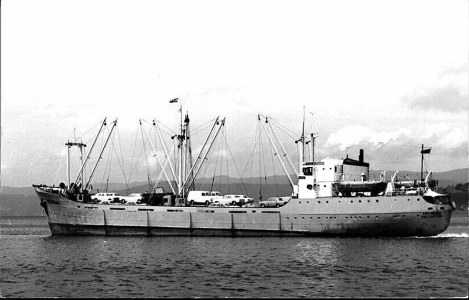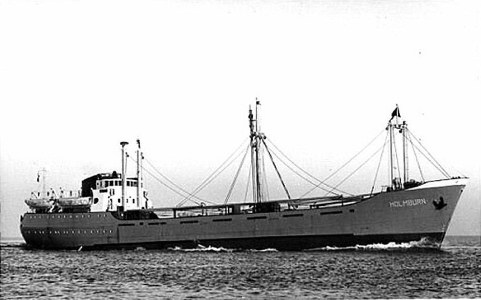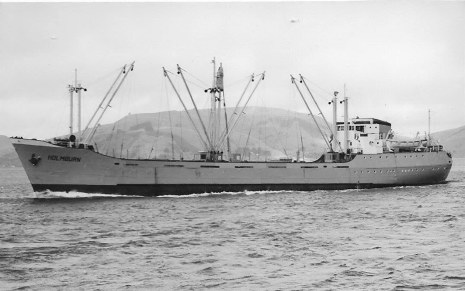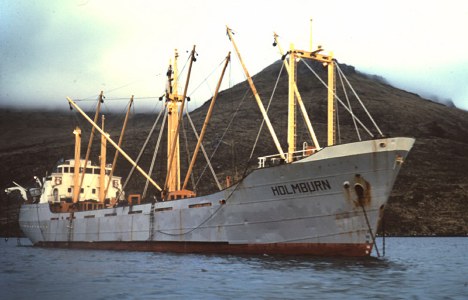The Ultimate New Zealand Soccer Website | home
Gael | Gamma | Guardian Carrier | Ha'amotaha | Hauiti | Hauturu | Hawea | Hokianga | Holmbank | Holmbrae | Holmburn | Holmburn | Holmdale | Holmglen | Holmglen | Holmlea | Holmlea | Holmpark | Holmwood | Hotunui | Hunte | Ile De Lumiere | Inaha | Induna | Inger Riis | Inparma Progress | Jackson Bay | Jaguar | James M Cook | Jaya No. 6 | Jean Philippe | Jill Coast | Josephine | Kaapgracht | Kaitoa | Kali | Karepo | Karetu
Holmburn
 Sourced from www.photoship.co.uk
|
||||||||||||||||||||
Built in Martenshoek, she was powered by one 1240hp eight-cylinder Crossley Bros. diesel, and had accommodation for twelve passengers. She had the distinction of having the largest refrigerated cargo space - 10,000 cubic feet - of any New Zealand coastal vessel.
She was designed for the Chatham Islands trade - 2600 sheep could fit in the for'ard hold, and 250 tons of chilled / frozen cargo in the aft hold - and the coastal service, primarily Lyttelton to Raglan, and when she first called at Onehunga in 1958, she was, to that point, the biggest ship to call at the Port in history.
 Sourced from www.photoship.co.uk
This meant "Holmburn" often had issues traversing the Manukau Harbour, and alongside at Onehunga, where the low water depth is marked at 3.35 metres (11 feet). The ship's average loaded draft was 3.88 metres (12.75 feet), so she was often scraping the soft mud on the bottom at low tide.
Within two years of being built she was badly damaged by fire at Lyttelton on 7 - 8 May 1959. Captain Derek Crabtree, aged just 29, and Chief Steward Hempstalk both died in the incident, while the bridge and crew's quarters were completely gutted.
 Sourced from Ships of NZ Facebook page
She was back at sea by November, and assisted in the search for survivors of "Holmglen" off the South Canterbury coast.
Her boiler blew up on a voyage from Waitangi to Lyttleton in April 1961, and in September 1962 she was stranded on a sandbar at the entrance to Raglan Harbour for 26 hours - not fun given she had a thirty degree list as well!
 Sourced from Ships of NZ Facebook page
On 5 June 1965, "Holmburn" departed Onehunga for two new destinations - Noumea and Norfolk Island - as she commenced a five-weekly Pacific Islands service which was later extended to Rarotonga. Two passengers boarded for the first trip, with ten heading to the islands a month later. Both voyages saw the ship depart port fully laden.
The first voyage north saw her carrying 1400 tons of cargo, including 100 tons of refrigerated produce - lamb, butter, cheese and ice cream - bound for Noumea, together with 500 tons of potatoes which were loaded at Lyttelton, and 11 cattle carried in stalls on deck. 100 tons of joinery and pre-cut timber was destined for Norfolk Island.
She also made annual calls to Campbell and Raoul Islands per a contract between Holm Shipping and the Civil Aviation Authority.
She was also stranded on a Manukau Harbour sandbank in the early 1970s (see pic at bottom of page), while in August 1967, en route from Tahiti to Rarotonga, she suffered engine trouble and had to be towed into port.
 Sourced from Ships of NZ Facebook page
On 16 May 1974, after departing Onehunga for Suva, an engine breakdown forced her to anchor on the Manukau Bar - cue the "Manukau" charging to the rescue, towing her to safety and to the Wattle Bay anchorage.
It proved to be a significant moment in her career, for within a year she was laid up for sale, something Singaporean interests were quick to take advantage of. She served her new owners for eight years before being broken up in Jurong in December 1983.
|

"Holmburn" stranded in the Manukau Harbour
Scanned from "New Zealand Tragedies - Shipwrecks & Maritime Disasters"
with the kind permission of writer Gavin McLean and publisher Grantham Publishing